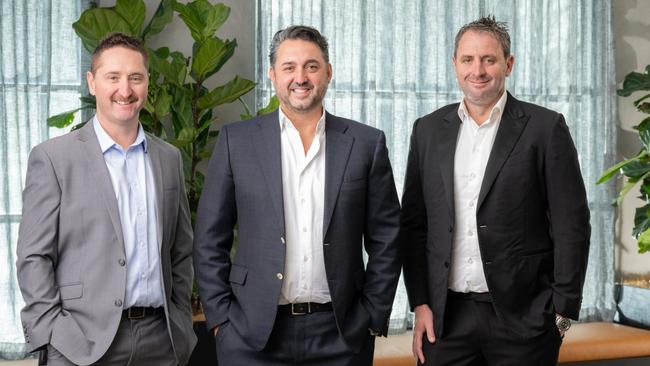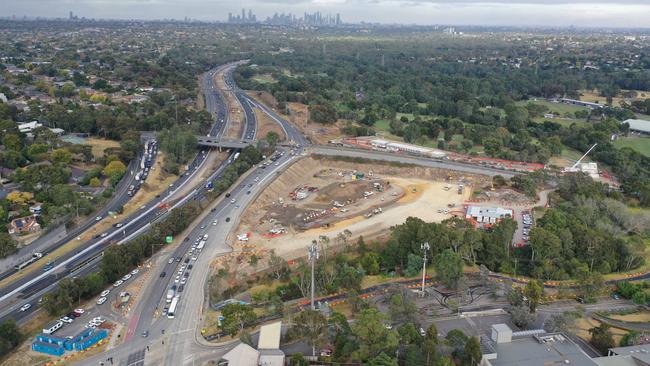Symal Group to list on ASX with $437m valuation
Symal Group will make its $437m ASX debut on Thursday, amid a $1.3bn pipeline of work underpinned by major government infrastructure projects.

Government spending on major infrastructure projects, the transition to renewables and emerging opportunities in industries like defence have Symal founder Joe Bartolo bullish about his civil construction company’s prospects over the next decade, and its capacity to reward investors who backed its IPO ahead of Thursday’s market debut.
Symal will begin trading on the ASX on Thursday with a $437m market capitalisation, after raising $136m from institutional and retail investors at $1.85 a share.
According to the company’s prospectus, it has $1.3bn of work-in-hand – representing estimated revenue of contracted work – across 200 live projects along Australia’s east coast, with more than three quarters underpinned by state and federal government infrastructure projects.
Mr Bartolo said public and private investment in major infrastructure projects will be needed to keep up with Australia’s surging population, and offered a strong platform for the Melbourne-based business in its core locations of Victoria, NSW, Queensland and South Australia.
“The industry is very buoyant, and for us, I’d say there’s a lot of work now and for the next 10 years – there’s still going to be a lot more to come,” he said.
“The renewables are super exciting for everybody, and there’s just so much opportunity in that space. There’s more renewable energy projects than what there are contractors.
“And then what government’s doing in defence ... you can see there’s a huge push in the budget to what they’re spending in that space.”

Starting working life in his family’s nursery business, Mr Bartolo went out on his own 23 years ago, borrowing a wheelbarrow and tools to set up his own landscaping venture.
The business diversified into small concreting and construction projects, before employees Andrew Fairbairn and Ray Dando joined as shareholders and directors in 2010, helping to drive the company’s rapid growth into new sectors and regions.
The company was rebranded to Symal – inspired by the Latin word ‘Simul’ meaning ‘together’ – in 2020, and currently employs more than 1000 staff from 11 offices.
Civil construction is the main game, but the group also runs an equipment hire division, a growing recycling and remediation arm and three quarries that supply building materials including sand and gravel.
It also owns a 49 per cent stake in Indigenous civil contracting business Wamarra.
Current projects include upgrades to Eastern Freeway in Melbourne’s east and supplying into the $600 million Hunter Power Project in Kurri Kurri, NSW.
According to the company’s prospectus, it turned over $769.6m in the year to June, and delivered a net profit of $32.8m.
Those figures are expected to rise to $961.1m and $41.6m in 2024-25.
After Thursday’s float, the three founding shareholders will retain a 62 per cent stake in the company.
Mr Bartolo said the capital raise would enable Symal to grow into new regions, both organically and via acquisition.
“We are a highly profitable business, we generate a lot of cash and so we’ve never really needed to list,” he said.
“But for us, it was all about growth and building a legacy around what we’ve created.
“We’re so excited about what the future brings ... through organic growth and inorganic growth as well by way of acquisition.
“It’s focusing on the regions that we’re already in, it’s acquiring more businesses there, it’s about taking more market share, but also a longer term strategy would be to move into other areas such as Western Australian and Northern Territory as well.”
Mr Bartolo said the IPO was oversubscribed, with investors hungry for new opportunities amid a dwindling pipeline of new listings on the Australian sharemarket.
“The lack of IPOs has definitely been a positive, and I think we’re going to be the beneficiaries of that,” he said.
“Hopefully our share price trades well once we’re a listed entity ... we’ve got great stories behind us and the proof’s in the pudding.
“We’ve performed extremely well in the past, and we want to continue to perform extremely well into the future.”





To join the conversation, please log in. Don't have an account? Register
Join the conversation, you are commenting as Logout